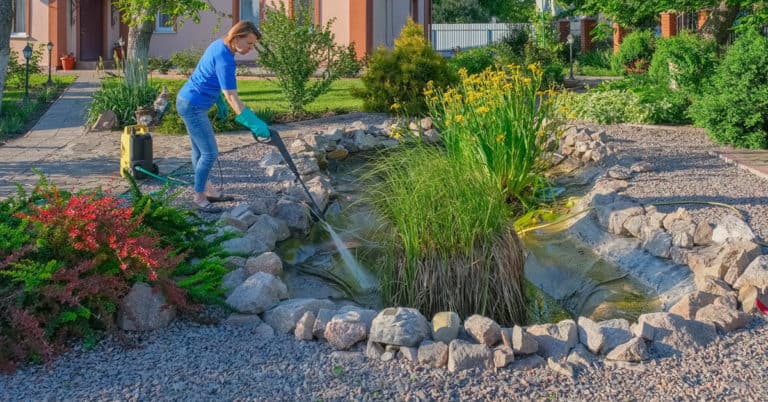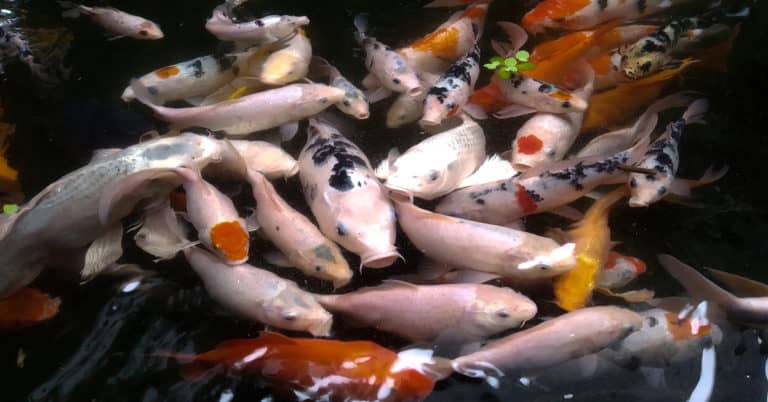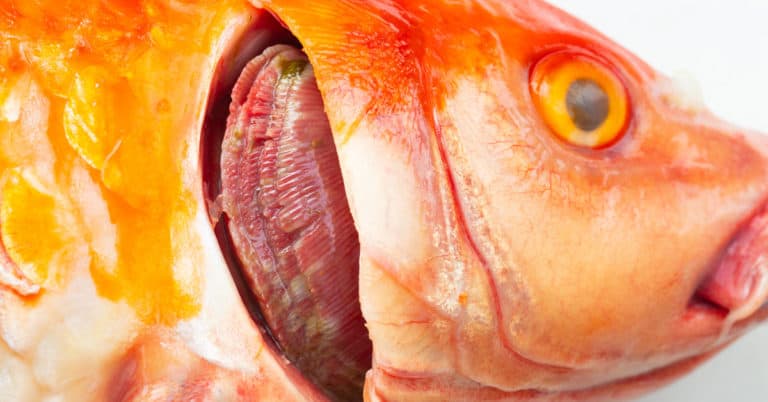Turtles are interesting reptiles that are facing extinction due to the loss of their natural habitats. If you’re tempted to integrate turtles in your koi pond to give them a safe place to live, you first need to know if these creatures can live in harmony.
While not as big of a threat in most areas when compared to Herons and raccoons, turtles can be a koi pond predator and can devastate your pond.
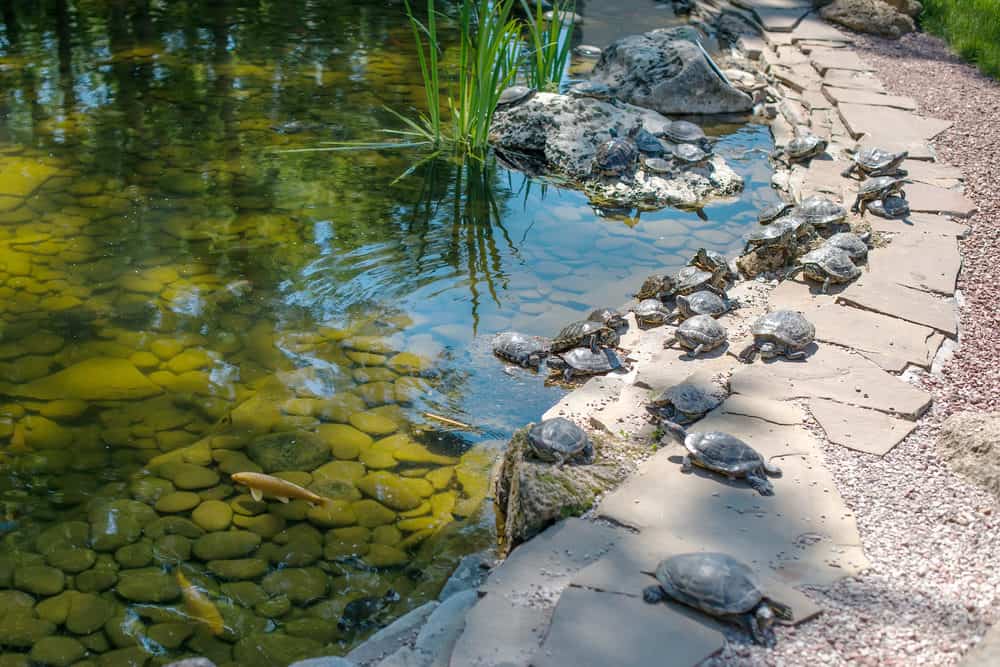
After getting a broad overview of the types of turtles, you’ll learn how to protect your koi pond from predator turtles. You’ll also find out what some varieties of turtle can add to your koi pond. Having a koi and turtle pond can make your backyard a relaxing place to spend time.
Different types of turtles can harm your pond. Some will try to eat your fish, but almost all carry diseases. Bacteria and diseases that are foreign to your koi can cause serious problems to the health of your pond’s ecosystem.
Snapping turtles are very aggressive. They’ll attack fish of any size and will even come after your toes and fingers if you’re in the pond. They are native in many areas of the United States, including:
If you live in the West or Pacific Northwest, you most likely won’t have a problem with snapping turtles invading your koi pond.
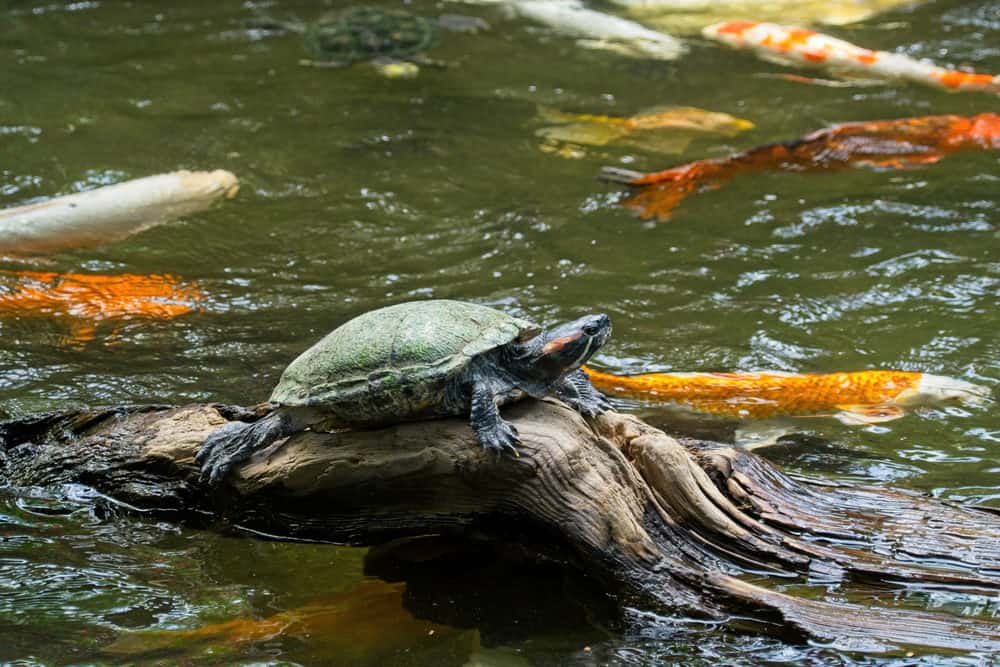
Despite the similar name, alligator snapping turtles aren’t closely related to snapping turtles. Their name gives you an idea of how powerful their jaws are. They also have ridges on their shell that resemble alligator skin.
You can find these turtles in freshwaters around the southeastern United States.
Softshell turtles have sharp beaks that can cause serious injury. They also have long necks that give them great range to attack quickly.
These turtles live in rivers, lakes, and ponds across the central and eastern regions of the United States.
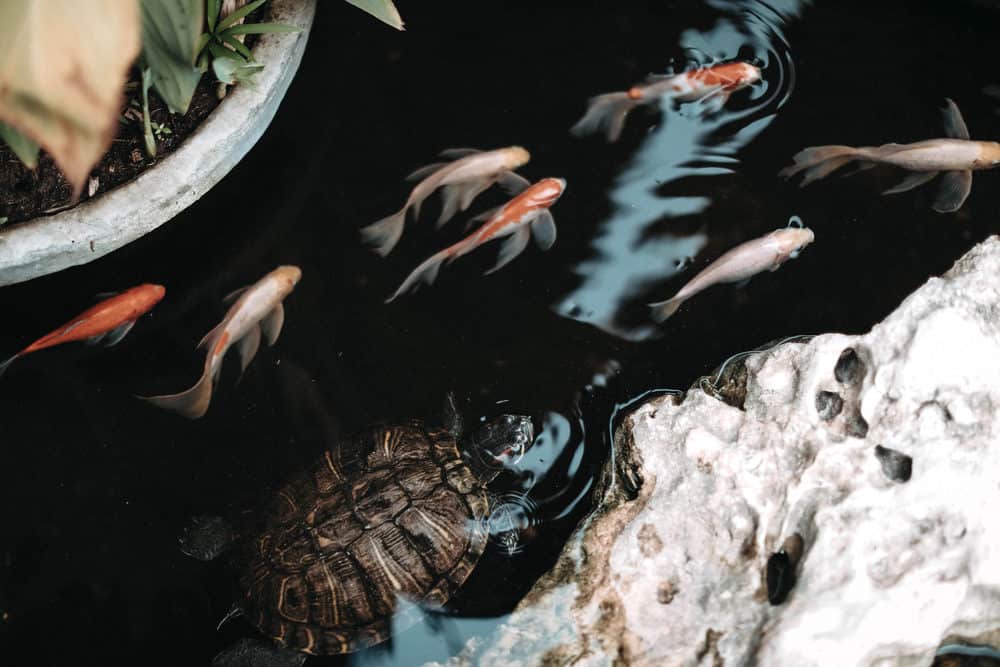
Red-eared sliders are popular pets, but they’re an invasive species because it eats almost anything it can find. This means it will at least try to eat your koi. Even if it doesn’t consume the entire fish, they’re likely to repeatedly nip at the fish, damaging their fins.
These turtles are native in the central area of the United States, but you might find them as far west as New Mexico and as far east as West Virginia.
Turtles are scavengers that will come to your pond to eat your koi fish and their eggs. They’ll even eat the fish food, which can leave your koi malnourished and susceptible to infections.
The easiest way to protect your fish from turtles is by using a turtle trap. One popular design is a floating trap that turtles climb onto in order to sun themselves. When they reach the top of the trap, they fall in. You can also place food inside of the trap to lure turtles in.

Different sizes are available depending on your pond’s area. Most traps can hold multiple turtles at the same time, so you don’t have to release one to catch another.
After you’ve caught turtles, don’t remove them from the trap by grabbing their shells. Many turtles, such as snapping turtles, are flexible enough to bend their neck and bite at your fingers. Instead, take the trap to an area with water and food so they can survive. Leave the trap open so the turtles can leave on their own.
It’s easier to keep an aquatic turtle alive if it’s native to your area. Then you know that they can withstand the climate, temperature ranges, and seasonal weather without needing much help from you.
You also need to check with your city, county, or state regulations to see what turtles you can keep on your property. Some municipalities have restrictions on introducing non-native species into outside habitats.
A few good choices of pond turtle breeds include:
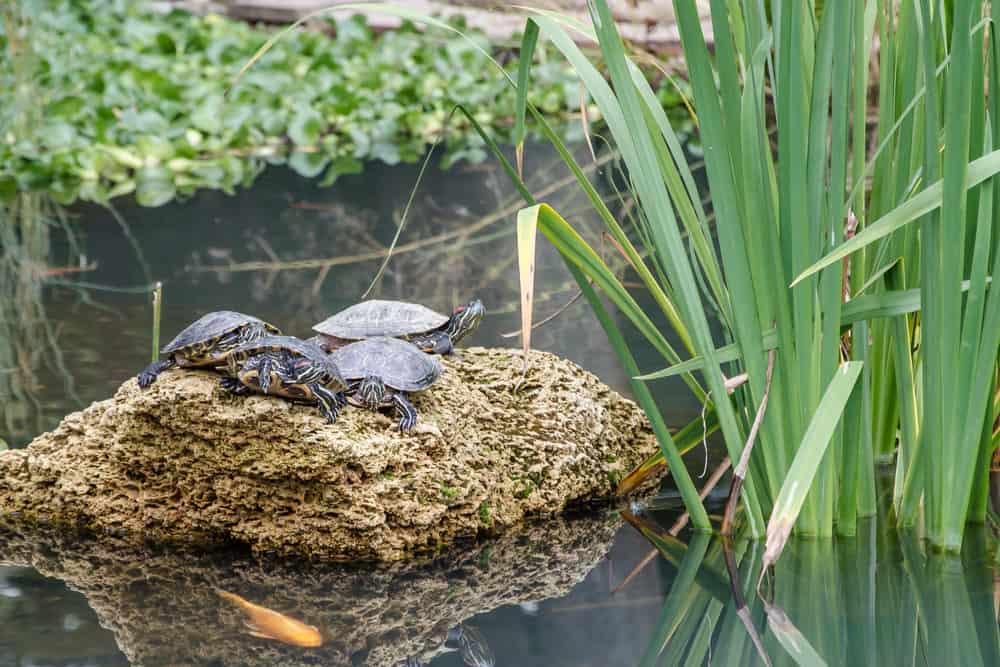
These beautiful turtles are a great addition to your koi pond with their red and yellow speckled shell. They’re small, usually maxing out at seven inches long. At first glance, these might look like red-eared sliders, so inspect them before you buy them. Both turtles have bright colors on their shells, but painted turtles only have yellow streaks on their heads, not red.
Painted turtles are common across the United States, so they won’t harm the environment if they escape your pond. Because they’re not an invasive species, they can safely live anywhere.
These turtles act laid-back and won’t attack fish, so they’re an ideal species to integrate into your pond. They love swimming, so you’ll see them having a good time in the water. They even safely hibernate in the water all winter, as long as your pond doesn’t completely freeze.
Painted turtles eat plants, insects, and decaying animals. Younger painted turtles are carnivorous but eat more vegetation as they get older.
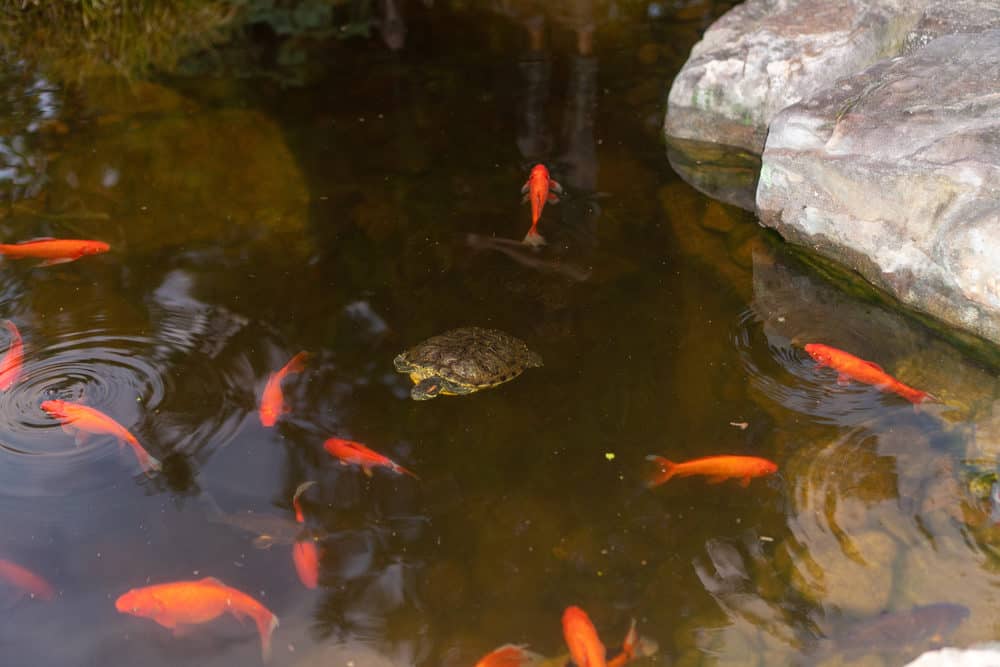
Box turtles are medium-sized turtles that grow to an average of six inches. They have tall, round shells decorated with bright yellow or orange spots.
They’re more likely to hang out around your pond instead of in it, which ensures your koi will stay safe. In the wild, these turtles swim with the purpose of getting somewhere. They don’t swim around in the water for fun like painted turtles love to do.
Box turtles usually eat fruits, worms, and insects, which you can provide for them in a bowl to keep them around.
Spotted turtles are small even when they’re fully grown. They’re attractive additions to your koi pond, with black coloring featuring bright yellow spots.
They love to eat snails, worms, and insects-especially spiders! If you have a pest problem in your yard, you’ll love how a spotted turtle takes care of things.
Technically turtles and koi fish can live together, but, as a pond owner, you have to be sure you want a turtle around. It takes a lot of work to keep the turtle satisfied, so they leave the fish alone. If a turtle gets hungry, it might try to eat your fish.
The best turtles to add to your koi pond are those that eat aquatic plants and insects. Keep in mind that turtles will like any plants you have growing around your pond. If you planted beautiful flowers to turn your backyard into an oasis, the turtles might destroy the surrounding vegetation.
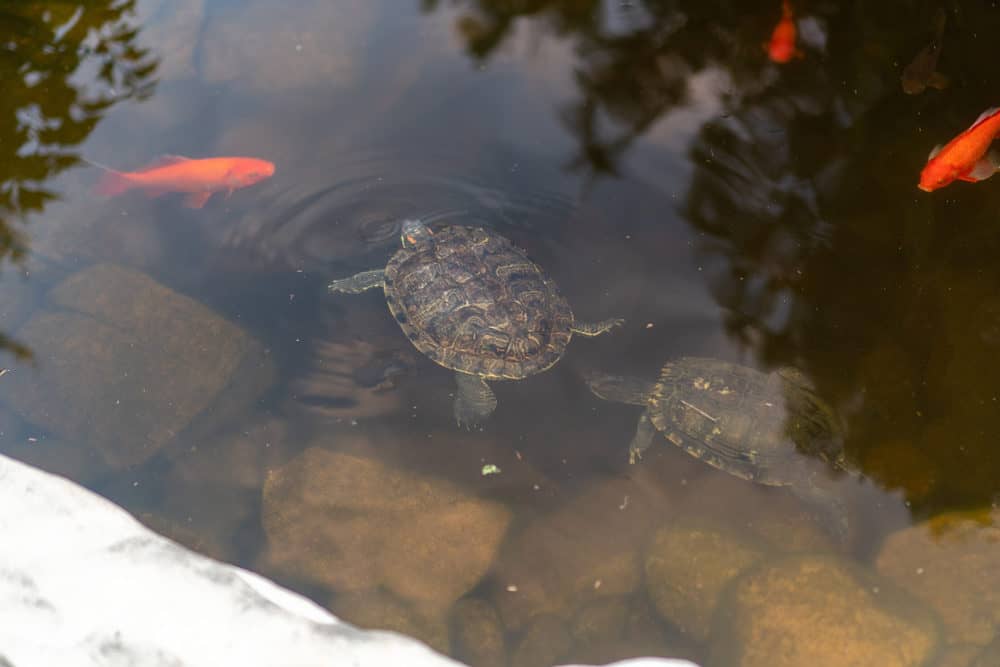
Give turtles enough food, so they won’t want your plants or koi as snacks. It will also prevent them from wandering away from the pond seeking more food.
Instead of giving them commercial turtle food every day, vary their meals with fresh vegetables and something more meaty. Most turtles love food like:
Since fish will also eat these foods, feed koi pond turtles from small plastic dishes, so they know what food is theirs. This also keeps food from getting rotten in the pond.
It’s best to introduce young turtles into a pond with mature koi fish. This way, the small turtle won’t be able to eat fish that are so much bigger. You still need to consider the turtle’s breed since many are aggressive and will attack fish regardless of size.
Even if the fish are too large to eat, the turtle can damage their fins and tails. These injuries can weaken their immune system and make them more susceptible to disease and infection.
If you have turtles in your koi pond, you’ll need to step up your water maintenance. Turtles defecate in the water, which turns it cloudy and can clog your filter. Before introducing turtles into your pond, upgrade to a filter that can handle bigger clumps of waste.
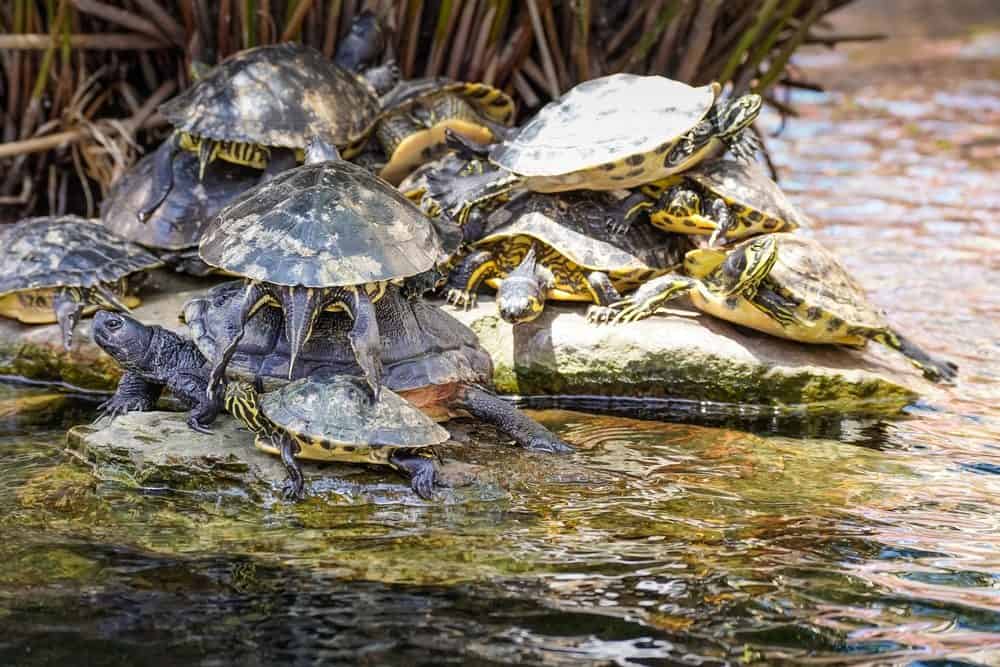
Turtles have sharp claws that will tear up your pond liner. Pond liners are effective at preventing the water from draining into the soil, but turtle claws will cause leaks. You might have to upgrade to a thicker liner coated with PVC. You could also use clay as a pond liner.
Basking is important to turtles, so make sure there’s a nice flat rock where they can relax and soak up the sun. There should also be space for the turtles to walk around. A ramp makes it easy for the turtles to get in and out of the water.
If you want to keep your turtles in the pond, or at least in your yard, you’ll want to install a fence around the perimeter to keep them from wandering off. You don’t need a tall fence-even something two feet tall is enough to contain them. As a bonus, a fence can also protect your pond from other predators.

